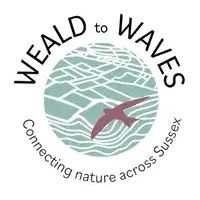Farming with Nature in Mind
By Lydia Baxter - 02 May 2024
The Wilder Ouse project, hosted by the Sussex Wildlife Trust, is a partnership project aiming to bring people together across the Ouse catchment for wildlife’s’ benefit. The idea is to create a climate resilient landscape by using nature-based solutions and restoring ecological connectivity. The small team of experts help to advise and deliver for various land managers on a range of conservation works. Farmers are integral to the work of Wilder Ouse, and the project is fortunate enough to be working alongside many inspiring, passionate individuals across the catchment.
Food, farming and nature are all interlinked. The quality and type of food we eat depends on a healthy and productive natural environment. At the same time, the way food is produced impacts on wildlife and the natural services that nature provides for us. Nature Friendly Farming practices are sustainable socially, environmentally and economically - they have a positive impact on nature, whilst producing nutrient rich food.
It's also important to realise and acknowledge that the climate and biodiversity crisis are interrelated, and the way we manage the land contributes to these crises. Equally, farmers can also be leaders in taking action to tackle them, and with 70% of the land area in Sussex being farmed, this would be a huge turning point for our native wildlife. To help tackle these crises and support healthy food production, we need a large-scale transition to Nature Friendly Farming.
‘We are close to nature and do our best to encourage wildlife. Our paddocks form part of a catchment for run off from surrounding farmland and flood regularly throughout the year. A lane acts as a dam so after heavy rain the whole area becomes inundated for days. We realised that keeping the ditches clear made matters worse. We then heard about the Sussex Wildlife Trust and the work it was doing through the Wilder Ouse project - the perfect solution: the possibility of nature-based land management combining flood control with habitat development, on otherwise unproductive land.’ Chris & Julia Mortimer, Laughton, Sussex
We also need people to support this transition through purchasing Nature Friendly Farming products, growing their own food, and shopping sustainably and locally. Not everyone can afford to choose organic, local food, so we need to work with food producers to ensure that access to healthy, affordable food is both people and wildlife friendly.
With the right incentives and support, there are many opportunities for farmers to provide a network of spaces for wildlife alongside food production. Regenerative and Agroforestry farmers are showing very effective ways of managing productive land for food as well as for wildlife and climate change. We need to put the health of our environment at the heart of our future land management policy. This means changing the current system and designing a new government system for farming and land management that is based on environmental outcomes and public benefits. Our farmers produce much more than just food - they provide health and well-being, pollinator habitat, carbon storage for climate change, natural flood management and much more. At Sussex Wildlife Trust, and through the Wilder projects (Projects | Sussex Wildlife Trust), we are campaigning for all these natural farming services to be properly recognised and championed.
‘I always think it’s important to mention the early work the Landscape Advisor at Sussex Wildlife Trust did here, which involved writing and commissioning two important reports for us, including her own Landowner Report and an Ecological report, as well as a survey by Sussex botanists of our wildflowers, and her spearheading of extensive work on Natural Flood Management (with the now known as Wilder Ouse Project, previously Sussex Flow Initiative). All this valuable input led to our decision to enhance the benefits of this work by agreeing to remove the redundant weir and reconnect the floodplain at the centre of our farm to restore the river, increasing water and soil quality. We have also created scrapes on other areas of our land and restored riparian habitat, as well as welcoming natural restoration at the edges of our fields.’ Helena & Candida Blaker, Haywards Heath, Sussex
To find out just how many types of nature friendly farming approaches there are, go to Nature Friendly Farming | Sussex Wildlife Trust and find out how you can get involved and make a positive difference.

